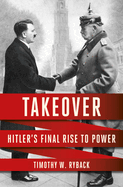
In the riveting Takeover: Hitler's Final Rise to Power, historian Timothy W. Ryback (Hitler's Private Library: The Books That Shaped His Life) examines the fraught, six-month roller-coaster of political haggling and backroom deals that brought Adolf Hitler to power. Germany's Weimar Republic was on its last legs in the summer of 1932 as Paul von Hindenburg, the 84-year-old Reich president and World War I general, struggled to prevent a "fracturing of the polity" between the violent extremes of Communists on the left and National Socialists on the right. The latter were led by the man whom Hindenburg dismissively called "the Bohemian corporal."
Supported by a wealth of archival material, Ryback chronicles how Hitler's vow "to destroy democracy through democratic process" came to fruition by January 1933--but not before he endured months of dizzying changes in fortune that nearly destroyed the Nazi movement. At times, Hitler's handling of political setbacks revealed him "to be more waffler than Führer," Ryback argues. Hindenburg, the lone sympathetic figure in Ryback's narrative, faced "a full-blown case of 'constitutional paralysis' " and required a chancellor "with the personality and capacity to break" it.
That history is not as inevitable as most might believe forms an unsettling undertone throughout the book. Ryback's brief chapter on the day of Hitler's accession to the chancellorship reads as a near comedy of errors when a last-minute disagreement breaks out between Hitler and his compatriots on their way to the reception hall. Takeover is startlingly relevant history, well-wrought and splendidly researched, that reveals how democracies can die democratically. --Peggy Kurkowski, book reviewer and copywriter in Denver, Colo.

